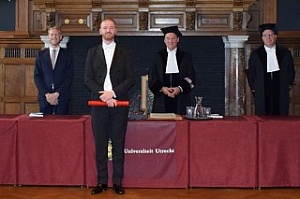Sergey Lazarev, holder of a bachelor's degree from the Faculty of Geology and Geography and a master's degree from the TSU and University of Lille-1 (France) double-degree program, has completed his postgraduate studies at the University of Utrecht (Netherlands). In July, he defended his dissertation at Utrecht on the environmental crisis of the Late Miocene and Middle Pleistocene in Western Eurasia and received his PhD. Analyzing changes in ecosystems remains relevant because of the global decrease in biodiversity and the dominance of invasive species due to climate change and other human activities.
In the double-degree master's program between TSU and the University of Lille-1, Sergey Lazarev studied for the first year in the master's program at TSU (Geology, specialization Stratigraphy), and for the second year he studied in France.
- At the end of my stay in France, I received a letter from my European colleagues and friends about recruiting PhD candidates to work in a large European project called PRIDE (Pontocaspian Biodiversity Rise and Demise). Its task was a comprehensive study of the causes of the current ecological crisis in the Ponto Caspian Region, the region of the Black and Caspian seas. For this, it recruited young researchers from different scientific areas: biology, geology, ecology, and climate modeling, who were distributed in scientific institutes in Germany, the Netherlands, Great Britain, and Romania. I sent my application and, as I learned later, out of 350 received, it was included in the shortlist of 30. As a result, I was invited for an interview. It took place in two stages - a presentation of the scientific research (for the most part, a master's project and work experience) and a direct interview with several members of the commission. So I became one of the 15 participants in the project and at the end of the summer of 2015, after defending my master's degree at TSU, I left for the Netherlands, - says Sergey Lazarev.
His workplace was the Paleomagnetic Laboratory. Fort Hoofddijk of Utrecht University. The project lasted four years, during which time Lazarev took part in 15 interdisciplinary units of training in eight countries, a two-month internship at Cambridge, and ten field expeditions. His dissertation was titled, “From the Eastern Paratethys to the Ponto-Caspian Basins: Magneto-Biostratigraphy of the Late Miocene and Middle Pleistocene, Sedimentary Architecture, and Faunistic Turn of the Shrinking Basins of Western Eurasia.”
Work on the project helped to identify and accurately date several episodes of the ecological crisis in the Western Eurasia region. This crisis was accompanied by the mass extinction of certain groups of organisms, most often mollusсs, and their further replacement by new invasive (alien) species. The ecological crises themselves were associated with changes in the hydrography of the basins and water parameters, which in turn were a reaction to global climatic and regional tectonic processes.
The issues of restructuring ecosystems due to the decline in biodiversity and the dominance of invasive species are relevant for many regions of the Earth, especially in light of the rapid global climate change and the intensification of anthropogenic processes. Among other things, new dating, obtained by combining several methods, showed that the current regional stratigraphic schemes - which represent the subdivision of the region into geological intervals and are important for geological mapping - are very outdated and need to be revised.

